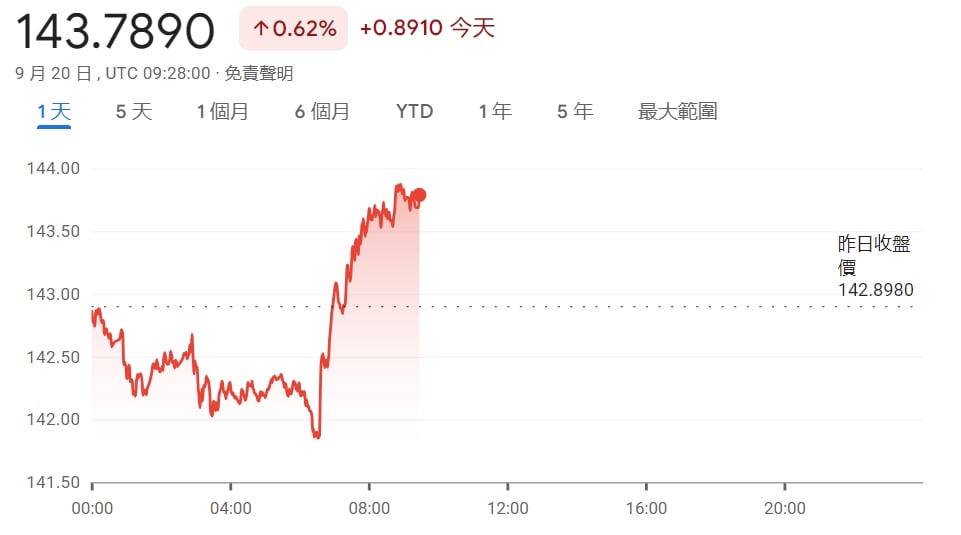The Bank of Japan announced the end of its negative interest rate policy in March and raised interest rates for the first time since February 2007. In July, it raised interest rates from 0% to 0.1% to around 0.25%, returning to the level of December 2008. However, this resulted in The sharp appreciation of the yen triggered a wave of unwinding of yen carry trades and caused a sharp fall in global stock markets.
Subsequently, financial markets continued to pay attention to the developments of the Bank of Japan. The Bank of Japan decided today to keep interest rates unchanged at 0.25%. As expected by the market, the Bank of Japan also raised its assessment of consumption. It believes that strong economic recovery will enable it to raise interest rates again in the coming months.
Bank of Japan keeps interest rates unchanged and plans to raise them again in the future
Bank of Japan Governor Kazuo Ueda held a press conference after the policy meeting and emphasized that the Bank of Japan's monetary policy decisions will closely monitor the economy, prices and financial market conditions. If the economy and inflation trends are in line with expectations, the Bank of Japan will raise interest rates again, and The prospects for overseas economic development are highly uncertain, and it is particularly important to pay attention to whether the U.S. economy will achieve a soft landing.
Regarding whether the market is stabilizing, Ueda Kazuo pointed out:
It's hard to say how long it will take to know for sure...but one factor we'd like to see is whether the U.S. economy will have a soft landing, or whether the slowdown will be more severe.
It is clear that the United States has entered a rate-cutting cycle. If this promotes a soft landing for the US economy, the negative impact on the Japanese economy will not be too great. But if the U.S. economy faces a more severe correction, we may need to change that view.
After the announcement of the Bank of Japan's decision, the US dollar-yen exchange rate rose to 143.78 yen per US dollar, and the yen depreciated slightly.

Interest rates may rise again in January next year
As for when the Bank of Japan will raise interest rates again, Wall Street's leading banks generally predict it will be January next year.
Goldman Sachs recently stated in a report that after the Bank of Japan raised interest rates in July, economic data and inflation trends were basically in line with expectations. Japan's GDP in the second quarter increased by 0.8% quarter-on-quarter, and rising wages have been partially transmitted to service industry prices, but it confirmed that inflation It will take time for inflation to rebound, and the best time to raise interest rates next is January next year.
Bank of America Merrill Lynch predicts that the Bank of Japan may raise interest rates to 0.5% in January 2025 and further raise interest rates to 0.75% in the second half of next year. Whether the Bank of Japan can gradually normalize policy may depend on the performance of the U.S. economy. prospect.
Is the Fed likely to make a policy mistake?
It is worth noting that compared with the Bank of Japan’s latest decision to avoid triggering a recurrence of market panic, the Federal Reserve’s decision to cut interest rates by 2 percentage points this week was criticized by investment institution MRB Partners. MRB Partners said in a report on Thursday that although The Fed believes the economy is in good shape, but its decision to cut interest rates sharply could be another policy mistake, as continued strong demand could reignite inflationary pressures.
MRB Partners pointed out that there is a risk that the Fed may be forced to withdraw its interest rate cut policy later this year or in 2025, similar to the policy mistake made in 2021.
The report pointed out that when the Federal Reserve started an interest rate cut cycle in the past, the business cycle indicators of the National Bureau of Economic Research (NBER) would show a weaker economic trend, but this time it cut interest rates significantly when the "economy is good". It is unusual, and considering the resilience of the U.S. economy, this aggressive rate cut seems a bit premature.
MRB Partners analyzed that several factors could lead to a resurgence of inflation, including a tight labor market driving wage growth, ongoing supply chain challenges, geopolitical tensions affecting commodity prices, and the lagging effects of fiscal stimulus measures.







